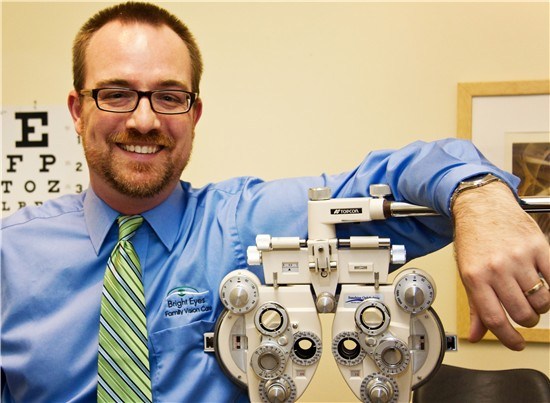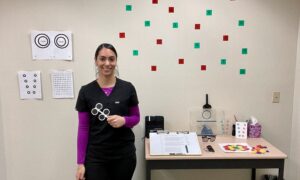By Nathan Bonilla-Warford, OD 
I was recently in Las Vegas for a conference, and my wife and I went to see LOVE, the highly recommended Cirque de Soleil show about the Beatles. For a big Beatles fan like myself, the show was amazing, and one after-effect is thatI’m reminded how Beatles songs fit in with everyday situations. For example, “I’m So Tired” comes to mind frequently while trying to get home from work in time to read my kids a story.
Right now my practice is going through some big changes; we are moving and expanding. While I could make all these decisions on my own, I’m confident I’ll achieve a better result quicker “With a Little Help from my Friends.” While optometric consultants are not precisely friends, a good, comfortable relationship is highly important when choosing someone to work with. Regardless of their qualifications and recommendations, if you don’t feel like you are connecting with a consultant, then keep looking. There is certainly someone else who both has the skills and the personality to fit with your practice.
Like most optometrists, I left school with almost no business experience. In order to gain needed skills and knowledge, I’ve hired helpful consultants in a variety of specific situations. Before the decision is made whether or not to a hire a consultant, the needs and goals of the practice at that time need to be considered.Here are some common reasons to hire consultants:
“Getting Better” – Learning business management
Many newly graduated optometrists want to own a practice but are nervous about starting a practice cold or buying an existing practice because they have limited managerial or business experience. For many, a new practice can be overwhelming. An optometric consultant can provide services by assisting in areas such as naming and branding the practice, practice design and build-out, hiring and training staff, and communicating with vendors and insurance companies. This information can save years of experience of having to learn by trial and error.
“Don’t Pass Me By” – Marketing
Both new and established doctors can find marketing in the new economy difficult.The traditional methods are often both more expensive and less effective. Consultants can help to create a comprehensive marketing strategy that effectively gets patients in the door using all available tools.
“Fixing A Hole” – Adding a specialty service
In a competitive geographic area, an optometrist can both increase practice revenue and visibility by adding a specialty service, such as vision therapy, low vision, or orthokeratology. Consultants can get you up to speed quickly in clinical care as well as staff management.
“A Day In The Life” – efficiency, patient flow, systems
Even the best practice can suffer from inefficiencies. Many of these can be identified and fixed simply by proactive practice management, but all practices have the problem that “they don’t know what they don’t know.” Consultants conduct thorough evaluation of practice processes over one or more days and help you improve in areas that either had not been considered problems or had been ineffectively managed previously.
“You Never Give Me Your Money” – insurance billing
For most optometrists, insurance billing and coding is important, but not something that comes naturally. It is unreasonable to think an optometrist can do this effectively on their own. Fortunately, help exists from simple software packages to companies that handle application and certification as well as providing best practices for submitting claims.
“We Can Work It Out” – solving big problems
Sometimes optometrists find that they have large problems that are simply beyond their ability to manage on their own. These may be situations involving partners, legal issues, or systemic issues that affect the entire staff. Also a large transaction such as buying/selling a practice can be complicated and involve emotion on both sides. A third party that is familiar with similar situations may not be cheap, but can provide a workable solution.
“When I’m 64” – an exit strategy
All optometrists should be managing their practice with an eye toward how they want to practice in their later years. Some are more effective at this than others and even the best prepared find that circumstances can change significantly. From whatever your starting point, a consultant can make sure that you are closer to the goal when the time comes.
There are many reasons why optometrists are reluctant to hire consultants. They may think “I Feel Fine” and have no desire to improve their practice without outside help. They may feel that they already give too much money to the “Taxman,” and cannot afford to hire someone.They may feel that they are already working “Eight Days a Week” and have no time to implement change. All of these may be legitimate reasons, but you also do not want to wind up being “The Fool on the Hill” and not reaching your practice potential purely because you are too proud to ask for help when you need it.
Have you used an optometric consultant to aid your practice? What kinds of practice challenges could you use outside help with?
Nathan Bonilla-Warford, OD,of Bright Eyes Family Vision Care in Tampa, Fla., is a graduate of Illinois College of Optometry. He is a member of the American Optometric Association, and is currently immediate past president of the Hillsborough Society of Optometry, as well as chair of the Children’s Vision Committee of the Florida Optometric Association. To contact him: Doc@BrightEyesTampa.com.





















